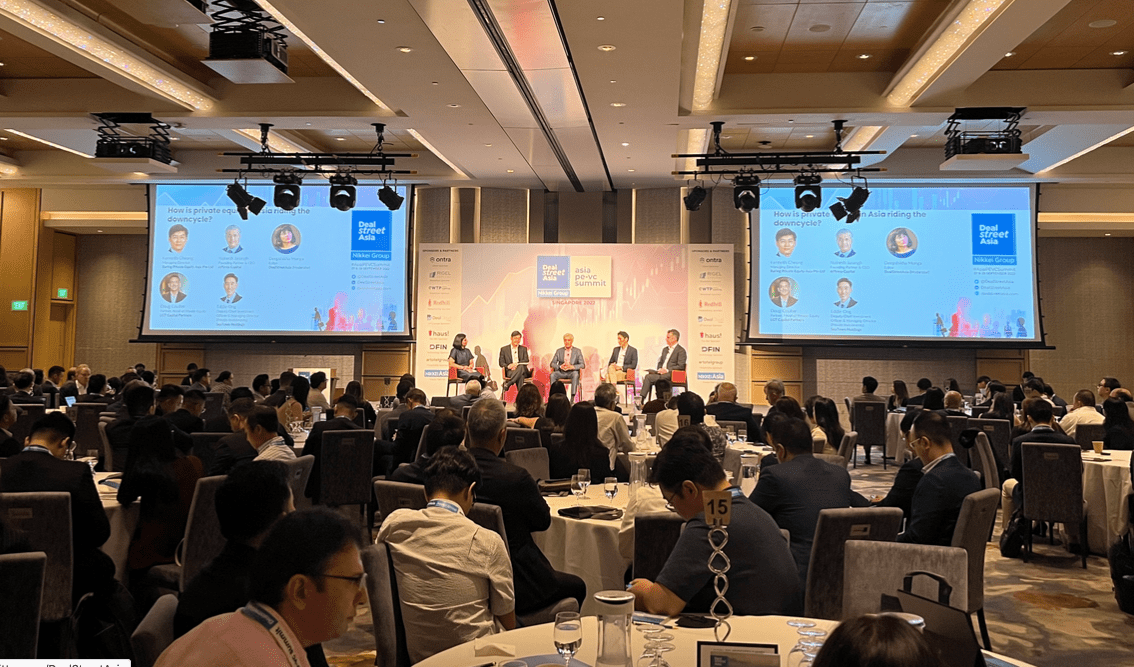- Jenny Lee, Senior Managing Partner, Granite Asia
- Shailendra Singh, Managing Director, Peak XV
- In conversation with Joji Thomas Philip, Founder & Editor-in-Chief, DealStreetAsia
The venture capital funding drought that has plagued SE Asia for the past two years shows little signs of letting up. The total volume of equity funding in Southeast Asian startups declined in the second quarter, reversing the upward trend of the previous two quarters. Against the backdrop this backdrop, venture-backed companies are in survival mode. They are racing towards profitability, and tightening their belts through marketing cuts and workforce reductions. Does the challenging funding climate raise concerns about recovery in 2025? Will investors’ cautious approach linger?
Founders’ take: Building & scaling an anti-squeeze startup in SEA
- Aaron Tan, Co-Founder & Group CEO, Carro
- Wai Mun, Founder & CEO, Doctor Anywhere
- In conversation with Aastha Maheshwari, Senior Reporter (Indonesia), DealStreetAsia
Amid the prolonged funding winter and liquidity crunch, startups across Asia have resorted to drastic steps including cost-cutting, layoffs, diversification of revenue streams, business pivots, and scaling down non-viable operations to meet investor expectations and chase profitability metrics. This panel features leaders from two top startups Carro and Doctor Anywhere to know how they navigated the downcycle. Auto marketplace Carro earned unicorn status in 2021 after raising its $360-million Series C funding led by SoftBank Vision Fund 2 while SE Asian health platform Doctor Anywhere last raised its Series C1 extension in Dec 2023 amid a funding downturn.
PE gears up for a bigger role in APAC’s energy transition
- Chenhua Shen, Fund Partner, I Squared Capital
- Khan Yow, Managing Director, Seraya Partners
- Wymen Chan, Head of Asia, SUSI Partners AG
- Tsubasa Suruga, Singapore Correspondent, Nikkei Asia
Asia Pacific’s vulnerability to climate change is clear. Nearly 13 out of 30 countries in the region are forecast to be adversely impacted by extreme weather, according to the World Bank. As investors join hands in taking action, energy transition investment in Asia Pacific has driven global growth for several years. Investment activities have also proven attractive opportunities for private equity players in a sector that was meant for impact investors in the past. Private equity firms are expected to bring their unique value-creation approach to enhance performance in this risky space. This panel will explore how private equity can play a further crucial role in the region’s energy transition agenda.
LP View: Can emerging managers beat the first-time fund blues?
- Shelly Porges, Co-Founder and Managing Partner, Beyond the Billion
- Sharon Liang, Principal & Head of Southeast Asia, Siguler Guff & Company
- Sean Yoo, Head Asia Pacific, Private Equity, Federated Hermes
- Michelle Teo, Senior Journalist & (former) Managing Editor, DealStreetAsia (Moderator)
As limited partners (LPs) are putting a greater emphasis on distributions, they rely on the track record of fund managers to generate liquidity throughout market cycles. The fundraising environment for emerging managers has therefore continued to deteriorate due to the selection bias by global LPs. Risk-averse investors understandably tend to favour established general partners (GPs), but at the same time, LPs who can be patient with performance are poised for potential upside by investing in burgeoning fund managers. What does it take for first-time fundraisers to beat the current market downturn? This panel will discuss the value of partnering with emerging managers; the private capital landscape and its impact on GP selection; the history of outperformance by smaller GPs; partnership dynamics in emerging managers and LPs’ due diligence checklist.
VC View: Where is climate-tech in South & Southeast Asia now?
- Mike Lim, Partner, TRIREC
- Helen Wong, Managing Partner, AC Ventures
- Ruchira Shukla, Managing Partner & Co-Founder, Synapses
- Mason Wallick, Managing Director/Chief Executive Officer, Clime Capital
- Amit Mehta, Managing Partner, Asha Ventures
- Andi Haswidi, Head of Data & Research, DealStreetAsia (Moderator)
Southeast Asia is quickly becoming a hub for green investments and innovation, driven by the urgent need to manage emissions and strengthen the carbon ecosystem in pursuit of net-zero goals. Southeast Asia-based climate tech startups, which focus on climate adaptation and mitigation solutions, sealed more deals in 2023 than in the previous year, despite turbulent market conditions, according to DealStreetAsia’s report: The State of Climate Tech in SE Asia 2023.
While climate tech in the region has made notable strides over the past year, it still trails behind regions like China, Europe, and the US. However, this gap offers a major opportunity for Southeast Asian countries to adopt cutting-edge technologies and accelerate their development.
VC investors provide essential support to early-stage climate tech startups, enabling the development and commercialization of new technologies aimed at reducing carbon emissions and enhancing sustainability.
This panel will explore the broader landscape of climate tech investing, covering current trends, the outlook for the coming year as well breakthroughs in climate innovation to accelerate Net-Zero goals.
Scaling Electric Mobility: Infrastructure, Batteries, and Emerging Transport Solutions
- Sebastian Togelang, Founder & Managing Partner, Rigel Capital
- Leon Farrant, CEO and Co-founder, Green Li-Ion
- Kunal Khattar, Founding Partner, AdvantEdge Founders
- Son Nguyen, Founder & CEO, Dat Bike, VN
- Khamila Mulia, Senior Correspondent, Indonesia, DealStreetAsia [Moderator]
The global automotive industry is swiftly moving toward sustainable mobility, and Southeast Asia is following suit. In the past five years, electric mobility in the region has made significant strides, with adoption gaining momentum. This transition presents exciting opportunities to foster more sustainable, inclusive, and resilient growth.
As numerous new EV manufacturers emerge, the attention has shifted to developing the entire EV ecosystem. This includes the upstream supply chain, components, charging infrastructure, and a battery recycling strategy to minimize waste, along with securing necessary investments.
This panel will explore the current state of the electric mobility ecosystem in Southeast Asia, strategies for scaling up, and the challenges ahead.



